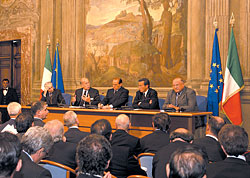 On 9 May 2005, it will be 55 years since the former French Foreign Minister Robert Schuman delivered his famous speech in which he proposed the idea of European Integration. This idea was born in the aftermath of numerous European wars culminating with the Second World War (1939-45) in which most European countries suffered terrible losses.
On 9 May 2005, it will be 55 years since the former French Foreign Minister Robert Schuman delivered his famous speech in which he proposed the idea of European Integration. This idea was born in the aftermath of numerous European wars culminating with the Second World War (1939-45) in which most European countries suffered terrible losses. Schuman recognised that any lasting peace in Europe would require that France and Germany together with their respective allies set aside their age old differences and disputes. Accordingly, he proposed a plan whereby Germany and France joined efforts to improve their industrial productions in close collaboration with other European countries. Due to the importance of coal and steel industries for their national economies, and being a major input in any weapons and war industry, Schuman knew that solidarity in this sector would make war between France and Germany not only unthinkable but practically impossible.
It took less than a year before Schuman's idea was translated into a binding legal document. On 18 April 1951, six countries-Belgium, France, Germany, Italy, Luxembourg and the Netherlands-signed the Treaty of Paris establishing the European Coal and Steel Community. Six years on, in 1957, the same countries signed up for closer cooperation in the Treaty of Rome by which the European Economic Community was established. Later, this merged into the European Community and what is now known as the European Union (EU).
Europe Day has been celebrated on 9 May since 1985, where European leaders at a high-level meeting decided to celebrate European integration and Robert Schuman's vision.
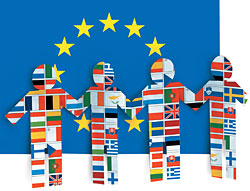 Continuous growth
Continuous growth In 2004, the EU reached a major milestone in terms of enlarging the cooperation with 10 Central and Eastern European countries reaching a total of 25 member states. In only two years time, in 2007, a new enlargement is envisaged with Romania and Bulgaria in 2007 and membership negotiations with Croatia, the Balkan countries and Turkey should begin later this year.
The continuous expansion and evolution of the European Union is a testimony of the success story of bringing lasting peace to European nations and people and more recently to a break down of long-standing dividing lines in Europe. The expansions have been successful because social, political and economic coherence have been given high priority. It may take some years for new member states to prepare for membership but at the end of the day the preparations allow new members to participate in defining European policies side by side with long-time members of the European family.
The European motto
Due to the fact that Europe is not only a continent with many different traditions and languages but also with shared values such as democracy, freedom and social justice, the EU motto is 'United in Diversity'. The EU and its institutions have a common flag that is used inside and outside Europe as a symbol of European Unity-the flag is blue with a circle of 12 yellow stars.
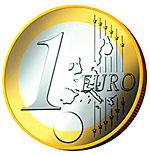 Recent EU achievements
Recent EU achievements In 2005, 55 years after the first initiative, European cooperation has gradually expanded and evolved. Today, the EU brings together 450 million people from 25 individual member states that cooperate and consult each other on almost all thinkable issues. In addition to the enlargement with 10 new member states in May 2004, the EU has made other great achievements in recent years.
In January 2002, the single currency, the Euro, was introduced in 12 member states and in 2004 the EU member states agreed on a new European Constitutional Treaty, which will now have to be ratified by the EU member states. In several countries, the European people will be consulted directly in national referendums. The constitution will in particular have an impact on the ability of the European Union to speak with a coherent voice in international affairs.
Many of the challenges that Europe and the rest of the world face in the age of globalisation can only be dealt with on an international level. Europe will continue to push for multilateral responses and promoting our core values-democracy, human rights, good governance and the rule of law.
The EU institutions
The three core European Union institutions are the Council of the European Union, the European Parliament and the European Commission.
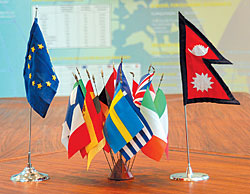 The Council consists of ministers from the national governments of all 25 EU member states. The Council shares with the European Parliament the responsibility for passing laws and taking policy decisions. The presidency of the European Union rotates among the member states on a six-month basis. In 2005, Luxembourg holds the EU presidency from January-June, to be taken over by United Kingdom from July-December.
The Council consists of ministers from the national governments of all 25 EU member states. The Council shares with the European Parliament the responsibility for passing laws and taking policy decisions. The presidency of the European Union rotates among the member states on a six-month basis. In 2005, Luxembourg holds the EU presidency from January-June, to be taken over by United Kingdom from July-December. The European Parliament is elected every five years by the European people. The present parliament was elected in June 2004 and has 732 members from all EU member states grouped in Europe-wide political groups. Nearly one-third (222) are women. The main job of the parliament is to pass European laws-a responsibility shared with the Council. In addition, the parliament approves the EU annual budget and oversees the work of the European Commission.
The European Commission represents the interest of Europe as a whole and it works independently from national governments. The Commission consists of 25 Commissioners-one from each EU member state. The current Commission President Jos? Manuel Barroso and his 24 Commissioners were appointed in November 2004. The Commission headquarters in Brussels prepares European laws and policies. Once laws, policies and programmes are approved, the Commission takes responsibility for their implementation in member states and in countries outside Europe, such as the development portfolio managed by the EC Delegation to Nepal.
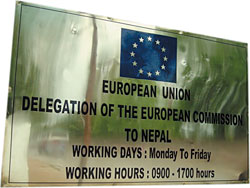 The EU in the world
The EU in the world It is not only Europeans that benefit from the EU. Given the success of European integration, the EU is committed to spread peace, stability and prosperity beyond its borders. The best way to prevent conflict from arising is to create prosperity and opportunities worldwide. As the world's largest trading power, the EU uses its influence to establish fair rules for world trade so poorer countries benefit from globalisation. As development partners, individual EU member states and the European Commission are committed to remain the world's largest donor.
The EU provides development programs and humanitarian assistance that benefit millions of people every day. The EU has also taken a lead in fighting pollution and promoting sustainable development worldwide. When it comes to promotion and protection of civil and political rights, the EU engages and provides advice and assistance to support democracy, human rights defenders, free media and respect for rule of law.
The EU in Nepal
Several EU member states are long-standing development partners with Nepal and currently five member states have their individual diplomatic missions in Kathmandu alongside the Delegation of the European Commission to Nepal. As an institution, EU established diplomatic relations with Nepal in 1975 and an EU-Kingdom of Nepal Co-operation Agreement was signed in June 1998. Within this co-operation framework high-level consultations-the so-called 'Joint Commission' takes place on an annual basis. The European Commission opened a Technical Office in Nepal in 1992. This presence was developed into the Delegation of the European Commission to Nepal in 2002. The current European Commission Strategy Paper for Nepal 2002-2006 identifies rural development, trade facilitation and conflict mitigation as priority sectors. In addition, the EC implements a significant human rights and democracy portfolio as well as humanitarian and Asia-wide assistance programs in Nepal.
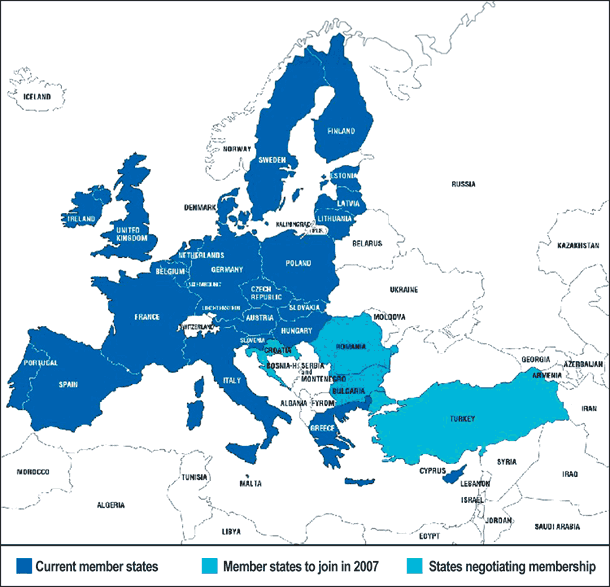
EU members and when they joined
1952: Belgium, France, Germany, Italy, Luxembourg, Netherlands
1973: Denmark, Ireland, United Kingdom
1981: Greece
1986: Portugal, Spain
1995: Austria, Finland and Sweden
2004: Cyprus, Czech Republic, Estonia, Hungary, Latvia, Lithuania, Malta, Poland, Slovakia, Slovenia


